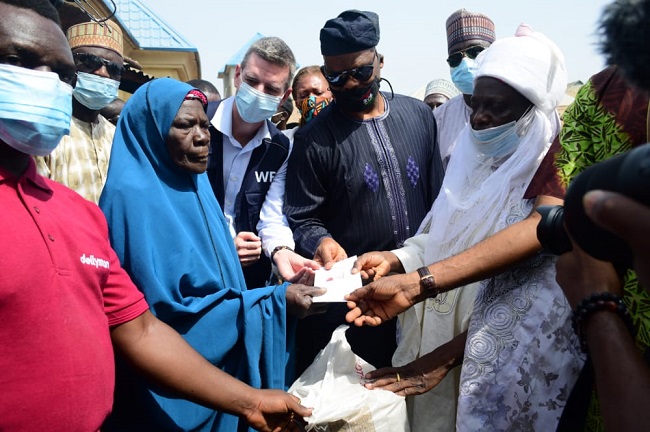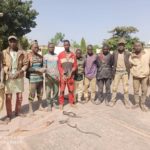Food items and cash worth $3 million are expected to be distributed to millions of vulnerable Nigerians across Lagos and Kano States and Federal Capital Territory (FCT) under the World Food Programme (WFP) programme with the support of the Switzerland Government
The WFP country manager, Mr. Paul Howe disclosed this during the flag-off of food items distribution in Karubiyi village near Karamajiji area of Abuja, during which the vulnerable households received 25kg of rice, millet, and their palliatives as well as N30,000 cash.
He explained that the beneficiaries were identified through the Federal Government, the local chiefs to make sure that we get to those who are in need because of the Covid-19 crisis.
Mr. Howe disclosed that about 58,000 most vulnerable people are to be reached in the FCT, noting that the initiative is being carried out in partnership with the CCDRN India, UBA, and Nigerian Government.
He added the “WFP has been in Nigeria for four years in the North-East geopolitical zone, namely Borno, Adamawa, Yobe but because of Covid-19,” the agency resolved to reach out to those impacted by the economic hardship caused by the pandemic.
“What we are trying to do with this exercise is a one-off two months distribution to meet the needs of the people. Indeed we had to see what happens, but we know that people are struggling, resources are limited all around but with what we have we want to talk to the right people within the two months assistance and then we have to see where we go from there,” he said.
In the bid to ensure sustainable food security in Nigeria, he explained that what we as a world organization is doing is to support Nigeria to achieve zero hunger by 2030 and that’s not just by providing cash and food. It needs to be sustainable. So we have to work not just on saving lives but we have to work on changing lives, that is working on livelihood, food system.
He also reiterated WFP’s commitment towards making it possible for people in Nigeria to sustainably meet their hunger needs.
While affirming the impact of climate change, he stressed that the focus has been on the North-East conflict which he maintained are major drivers or hunger we need to address if we are going to achieve zero hunger in 2030.
On the amount earmarked for the implementation of the programme in the selected states, he disclosed that: “First of all for Abuja, it’s over a million dollars incidentally it’s the same thing in other states,” just as he expressed optimism that the initiative will help to stimulate the economy.
According to him, “all the people who have been identified would be incorporated into the national social register.
“Aside from being COVID sensitive and economically smart, we want to think about long term about your question on sustainability, there are two aspects to this. One is that all the people who are registering that we have identified as vulnerable will go on a national social registry so that they can be included for distribution in the future as chronically vulnerable.
“The second thing is, some people don’t have bank accounts, so what we want to do is that we give them food and cash when they don’t have bank accounts, but we do enrol them into the banks so that they can be part of the banking system, so they are financially included,” Mr Howe noted.
He also unveiled plans to provide technical support for research institutes and Non-Governmental Organisations (NGOs) in the bid to ensure the sustainability of the programme in Nigeria.
On his part, the Minister of Humanitarian Affairs, Disaster Management and Social Development, Sadiya Umar Farouq reiterated the resolve of President Muhammadu Buhari’s administration towards alleviating the sufferings of the vulnerable groups across the country.
The minister who was represented by the Director of Human Resources, Mr Abdulrahman Babatunde Jaji, observed the palliative programme was supported by the World Food Programme with the view of supporting the poor and vulnerable people in Lagos, Kano and Abuja in the first phase of the programme.
He explained that the sum of N30,000 is being given to each of the vulnerable, adding that “it’s a continuous programme.”
“It is part of the food items include rice, millet, beans and other items, adding that it is part of the national social programmes” being implemented by the present administration.
YOU SHOULD NOT MISS THESE HEADLINES FROM NIGERIAN TRIBUNE
ICYMI: Nigeria Back Into Recession, Worst Since 1987
Nigeria is back into a recession. This time, it is the worst the country has experienced since 1987…






